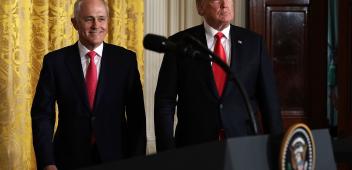TPP stifling rather than sustaining
TPP stifling rather than sustaining
Leon Berkelmans
Sydney Morning Herald
7 October 2015

Executive Summary
It's over the line. Or at least a line. The Trans-Pacific Partnership has been sealed. It now remains to be ratified by legislatures. This will provide all sorts of fun for those who love political intrigue.
But for those who love economics, this deal is hard to digest.
The first point to realise is that, like all trade deals, it is completely over-hyped.
We've heard of the transformational potential of previous deals. Remember our deal with the US 10 years ago? John Howard talked of the "enormous" benefits of the deal.
Ten years later, it's hard to see these "enormous" benefits. In fact Shiro Armstrong of the Australian National University found that trade had come in under what would have been expected in the absence of a deal.
So don't get sucked into the lofty rhetoric, it's wrong.
If there are upsides, they will be small. That's what modelling usually shows. For example, modelling by the Centre for International Economics found that the three marquee bilateral agreements signed over the last couple of years — with Japan, China, and Korea — would only increase GDP by 0.05 to 0.1 per cent. That's not a sustained increase in growth by the way, it's a one-shot bump.
But there are downsides in the TPP, downsides we don't understand.
First, let's look at intellectual property (IP). Australia is an importer of intellectual property, so any increase in intellectual property protection will hurt us.
We have been told that "TPP will not require any changes to Australia's patent system and copyright regime".
I hope they're right.
But it wouldn't be the first time these reassurances have been off the mark.
For example, before a parliamentary committee the Department of Foreign Affairs and Trade said it was not aware of any increase in our IP obligations in the Korean Free Trade Agreement, a position they later had to change.
In any case, the TPP further entrenches our IP law in international treaties. That gives us less room to manoeuvre in the future. And this has caused grief in the past. Bipartisan reforms have been scuppered because they were in violation of the Australia-US Free Trade Agreement.
Maybe increased intellectual property protection leads to more innovation globally. I think that's hard to argue based on historical experience.
One of my favourite books, Against Intellectual Monopoly by Michael Boldrin and David Levine, argues that more intellectual protection leads to less innovation, as companies divert attention away from creation toward protecting their turf.
Another problematic provision involves investor protection. We have expanded the scope for foreign companies to take us to a tribunal if they feel aggrieved by government action.
This can undermine legitimate government decisions.
We are assured caveats are adequate, so government decisions on, say, the environment, will not be challenged. But the caveats are often prefaced with the line "except in rare circumstances".
The caveat is not blanket, apart apparently for tobacco in the TPP, and any company can argue their case is rare. And if we are so worried about tobacco, why aren't we worried about other industries as well?
To further raise alarm, these rights given to foreign companies (but not domestic ones) have not been shown to increase foreign investment, their raison d'être.
The downsides are uncertain and could be large, while the upsides are small.
The agreement is bad. This is not the judgment of some ardent lefty protectionist. No. Eliminate all tariffs tomorrow I say. Unilaterally.
It may not lead to a nice photo op, but it is good policy.
Dr Leon Berkelmans is director of the International Economy Program and the G20 Studies Centre at the Lowy Institute.



